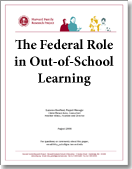The Harvard Family Research Project separated from the Harvard Graduate School of Education to become the Global Family Research Project as of January 1, 2017. It is no longer affiliated with Harvard University.

|
February 2009 The Federal Role in Out-of-School Learning: After-School, Summer Learning, and Family Involvement as Critical Learning SupportsHeather B. Weiss, Priscilla M. D. Little, Suzanne M. Bouffard, Sarah N. Deschenes, Helen Janc Malone |
Article Information
- Full Text (HTML)
- Full Text (PDF: 257 kb)
What, in conjunction with good schools, is necessary to increase the chances that all children, especially disadvantaged ones, will enter and leave school with the skills they need for 21st-century success?
This report from Harvard Family Research Project (HFRP) makes a research-based case for federal provision of out-of-school complementary learning supports from birth through high school, particularly for poor children, so that all students gain the skills that economists, educators, and employers agree are necessary for success in the 21st century.
Four decades of consistent research evidence demonstrate it is necessary to redefine learning—both where and when it takes place—and to follow up with innovations that enable communities to move to a complementary learning approach, if the country is to achieve its national goal of educating all children.
Read this report and learn about:
- Research and evaluation evidence that shows the benefits of out-of-school complementary learning opportunities in family involvement, after school programs, and summer learning programs.
- What federal leaders can do to build state and local capacity for complementary learning services and interventions that measurably contribute to children’s development, particularly their academic outcomes.
- Legislative and policy tools and examples of public–private partnerships that enable innovation, accountability, and evaluation for continuous learning and improvement of complementary learning pathways.
- Six recommendations for the federal government to develop, implement and test a national strategy for complementary learning, culminating in a proposal for a “Pathways to Educational Success Act.”
Commissioned by the Center on Education Policy (CEP) as part of a series of 11 papers on “Rethinking the Federal Role in Elementary and Secondary Education,” the report was presented at a forum on Capitol Hill in November 2008. For a full copy of this and other papers in that series, visit the CEP web site at www.cep-dc.org.
